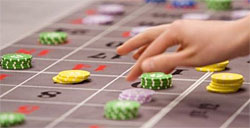Betting systems in the roulette
 With the growth of roulette game popularity, the players have made attempts to beat the casino and turn this game of chance into a game made to avail the player. It caused the emergence of certain betting systems, or strategies. Applying these systems, their creators claim, may result in beating the house edge of the casino.
With the growth of roulette game popularity, the players have made attempts to beat the casino and turn this game of chance into a game made to avail the player. It caused the emergence of certain betting systems, or strategies. Applying these systems, their creators claim, may result in beating the house edge of the casino.
The Gambler's Fallacy
Real Money Online Roulette: Top Sites to Play
Betting systems online slots consist in applying certain betting patterns that often rely on the idea that previous results of the roulette wheel spins are of any importance for the future outcome. It is also known as the 'Gambler's fallacy'. For example, it means that if the same color has come out five times in a row, then it has to be another color in the next spin, or that the player's loss has to be followed by win in the next game. Thus, the 'Gambler's fallacy' is exploited by means of making bets opposite to the previous game outcomes.
In fact, the roulette wheel has no 'memory', and every spin of the wheel is an independent and unique event with no relation to the previous spins. Anyway, casinos seem to encourage applying of such myths to make use of the credulous players and increase profits at their expense.
- According to the Martingale betting system, the player must double every next bet after the loss. The system is applied mainly to the outside bets. In ideal the first win is supposed to cover previous losses and bring profit that is equal to the bet itself. In reality, especially as we know that no previous results affect the outcome of the spin, the player may either lose all of his or her money or exceed the betting limit of the table.
- Another betting system is known as the Fibonacci sequence. It is based on the sequence of numbers developed in the 13th ct. by Leonardo Pisan, the Italian mathematician. Fibonacci sequence looks like this: 1-1-2-3-5-8-13-21-34 and so on, which means that each two previous numbers are added to make the next number (like 1 plus 1 is 2 and 1 plus 2 is 3). Like in Martingale system, following the Fibonacci sequence the player who loses has to increase the size of the previous bet. But this system doesn't require doubling the bet. The player simply follows the Fibonacci sequence.
- Dopey experiment. According to this system, the player divides his or her funds into 35 units and bets a unit on a certain number for each of 35 spins. If the bet wins, the player may recover his or her bankroll. In reality, the probability that this certain number will hit is too small to take it into account, especially in casinos with a double-zero American wheel.
- Labouchere system consists in using a line of numbers to define the amount of the bet that follows a loss or a win. 2 outside numbers in the line represent the amount of the next bet. If the bet wins, the player crosses out these two numbers and proceeds with the numbers that remain. The lost bet is added to the line's end thus making the player proceed with a longer line now. When all numbers are crossed out, the player may proceed with a new line.
- D'Alembert system. It is also known as a 'pyramid system' that is, like the Martingale system, applied to the outside bets in the first place. According to this system, the amount of bets and losses is reduced to a minimum. The player using the D'Alembert system simply adds 1 unit to the bet after each loss. If a bet wins, the player deduces 1 unit from the following bet. This system concerns the 'gambler's fallacy' as it relies on the fact that the player's wins and losses follow each other.
In reality, no betting system works as they are claimed to be. The casino will always remain a place created for its own profit, not the profit of players, and player's losses will always surpass their winnings. Roulette is a game of chance with random results that cannot be controlled by players or dealers and doesn't depend on the previous outcome.
